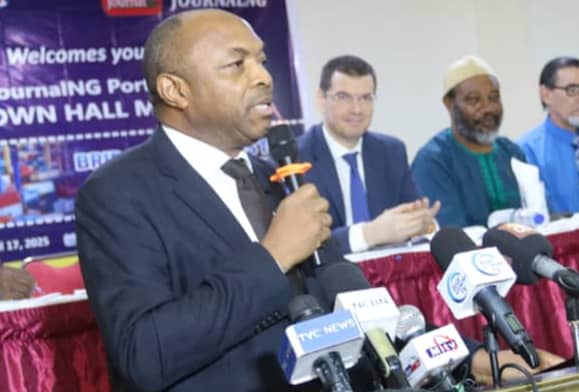Underutilization, Inefficiencies, and Bureaucratic Delays Hindering Nigeria from Becoming Maritime Leader in Africa – NPCC Chairman
By Raheem Ibrahim
The Chairman of the Nigerian Ports Consultative Council (NPCC), Mr. Bolaji Sunmola, has identified the underutilization of potential opportunities and inefficiencies rooted in infrastructural decay as major factors hindering Nigeria’s ability to dominate the maritime industry in Africa.
Sunmola further highlighted bureaucratic delays, fragmented regulatory systems, and limited operational hours as significant setbacks preventing Nigeria from becoming a maritime leader on the continent.
Delivering a speech at the 5th JournalNG Port Industry Town Hall Meeting themed “Bridging the Gap to Actualise 24-hour Port Operations in Nigeria: A Strategic and Sustainable Pathway”, held in Apapa, Lagos on Thursday, April 17, 2025, Sunmola emphasized that Nigeria’s seaports remain strategic gateways to the nation’s economy, facilitating over 85% of the country’s external trade by volume.
He stated, “A 2023 NBER working paper highlighted that increasing port efficiency from the 25th to the 75th percentile globally can reduce shipping costs by as much as 12%. For Nigeria, this presents a compelling case: if we are to fully leverage our maritime advantages, we must operate on a 24-hour schedule, like many global port hubs.”
Sunmola stressed the urgent need for 24-hour port operations, referencing leading international ports such as those in Singapore, Rotterdam, and Busan, which function round-the-clock. He noted that these uninterrupted operations lead to quicker vessel turnaround, optimized cargo flows, and harmonized hinterland logistics.
“In contrast, Nigeria loses productive hours at night, resulting in ship discharge delays and increased costs that ultimately burden the Nigerian consumer. Scientifically engineered continuous operations do more than extend working hours—they redesign the flow of goods, harmonize inter-agency actions, and bolster economic resilience,” he added.
The NPCC Chairman also pointed out operational gaps, particularly in digitalisation and technology integration. He praised ports like Rotterdam and Singapore for utilizing real-time digital platforms and Port Community Systems (PCS) that facilitate vessel scheduling, cargo tracking, customs clearance, and intermodal coordination.
“Nigeria’s National Single Window is promising in this regard, and we hope its coverage and integration become seamless,” he said.
On labour and safety management, Sunmola noted that global ports have adopted flexible, incentivized shift systems supported by safety technologies and real-time performance tracking. Conversely, Nigerian ports still struggle with rigid shifts and inadequate night-shift safety measures.
He highlighted critical infrastructure and security shortcomings—poor lighting, inadequate surveillance systems, and dilapidated access roads—that make night operations both risky and inefficient.
“Safe 24-hour operations require robust electrical grids, well-illuminated terminals, rail-link connectivity, and automated gate access,” Sunmola explained.
On the issue of fragmented regulation, he stated that ports operating 24 hours often do so under harmonized and digitized multi-agency frameworks. In Nigeria, however, he lamented that regulatory duplication leads to delays, higher transaction costs, and opportunities for corruption.
Sunmola also underscored the need to power the vision of 24-hour operations through sustainable and affordable energy models, noting that uninterrupted and cost-effective power supply is a key enabler.
“Nigeria doesn’t necessarily have to replicate energy-intensive, fossil-fuel-based models. We can leapfrog into renewables and hybrid microgrids tailored to our climate and capacity,” he said.
He cited viable options such as Solar Photovoltaic (PV), Hybrid Microgrids, Smart Energy Management Systems, and their economic and environmental benefits.
Referencing Solar PV, he noted Nigeria’s strong solar potential and cited global examples such as Jurong Port (Singapore) and the Port of Los Angeles, which use rooftop solar systems to power key terminals.
He added, “Locally, Nigerdock on Snake Island now offsets 40% of its daytime power needs using solar, cutting over 2,000 tonnes of CO₂ annually. This model can be replicated by more stakeholders across Nigerian ports.”




